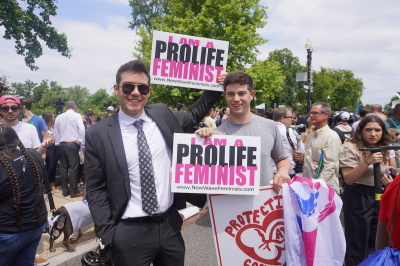I'm a father who lost 2 children to abortion. My voice didn't matter.

In the 1980s, men held up to 95% of federal judicial positions across America and more than 90% of congressional seats. Every U.S. president to that point — and since — has been male, and so have most religious leaders.
None of that male power made any difference to me in 1988, when, as a senior in high school, I found out that my girlfriend was pregnant. I wasn’t sure what to do, but her mother was — and so I lost my first child to abortion. Four years later, I lost my second, this time after begging my ex-girlfriend to keep the baby so I could raise him or her. She told me it wasn’t a baby, said it wasn’t my choice and got the abortion.
It’s common to say that men shouldn’t have a say in abortion because it is a woman who carries the child. The effects on her body are tremendous, as are the responsibilities, especially when her partner threatens to end a relationship or is already gone. And many men agree with the “not your body, not your choice” position — more than 60% of Americans have internalized the idea that women hold ultimate power over their unborn children, up to and including the ability to end their lives at will.
Meanwhile, little thought is given to fathers, except when holding deadbeat dads accountable for child support and weekend visits. But not every man who loses a child to abortion is suffering the consequences of an irresponsible hookup. Many are in serious relationships, as I was. According to the Guttmacher Institute, a prominent research organization which favors legal abortion, fully 45% of women who experience abortion are either married or cohabiting. And many women and men who call Support After Abortion’s Help Line experienced abortion despite being in stable relationships and having born children they love.
The fact is that many men not only feel responsible for their unborn children but suffer if their partners get an abortion. This is true even if they generally favor legalized abortion or profess a belief that the decision should be entirely up to women. I lead a men’s task force for Support After Abortion, a research and education group that conducted a national survey and found that more than 70% of men experience adverse impacts after their abortion losses. Seventy-eight percent of pro-choice men sought help or said they could have used someone to talk to.
Since starting my healing journey 14 years ago, with professional therapy, the support of my wife and living children, and my pastor, I’ve shared my story to help men feel that they can share their grief and pain. Often, the responses to my work have been amazing. But just as often, I’ve been told my feelings don’t matter, that men who struggle after abortion are “losers,” and that my family and I should “f---ing die.”
We would never say such things to someone struggling with other traumas. We console people whose loved ones have died, mourn with parents who have lost children and offer compassion to adults dealing with the abuse they experienced in childhood. Only when it comes to abortion does society say that men and women shouldn’t acknowledge their pain.
I’m now 53, married, with four children and three grandchildren. I miss my three deceased children, two lost to abortion and one to miscarriage, every day — and I will always express solidarity with other men who have endured similar tragedies. The fact that a small percentage of men hold positions of power means nothing to the everyday man who finds himself powerless during an abortion and suffering in isolation afterwards.
Regardless of our views on abortion, or of who has more legal or political power at any one time, we’re all individual human beings trying to find peace as best we can. Remembering that is how to help relieve a great deal of suffering –– even the suffering our society would rather sweep under the rug.
Originally published at IndyStar.
Greg Mayo is an award-winning author and speaker who helps men suffering from abortion-related lost fatherhood. He wrote the novel Almost Daddy and chairs Support After Abortion's Men's Task Force.





















